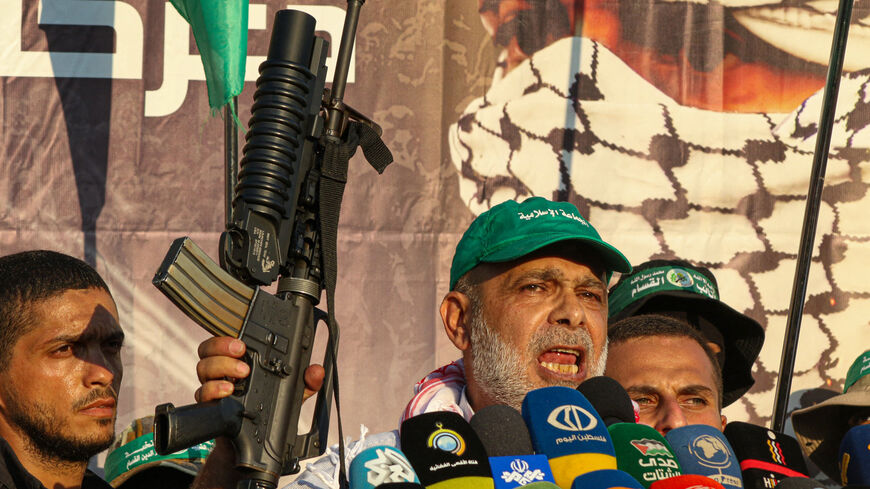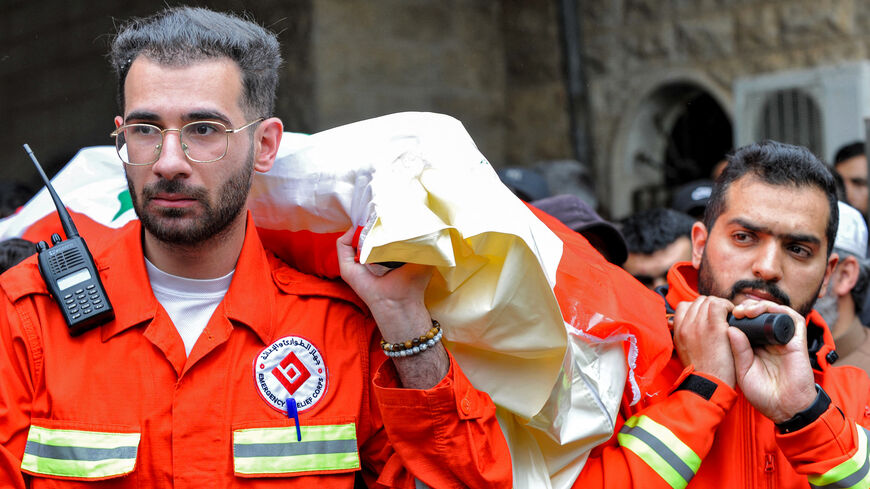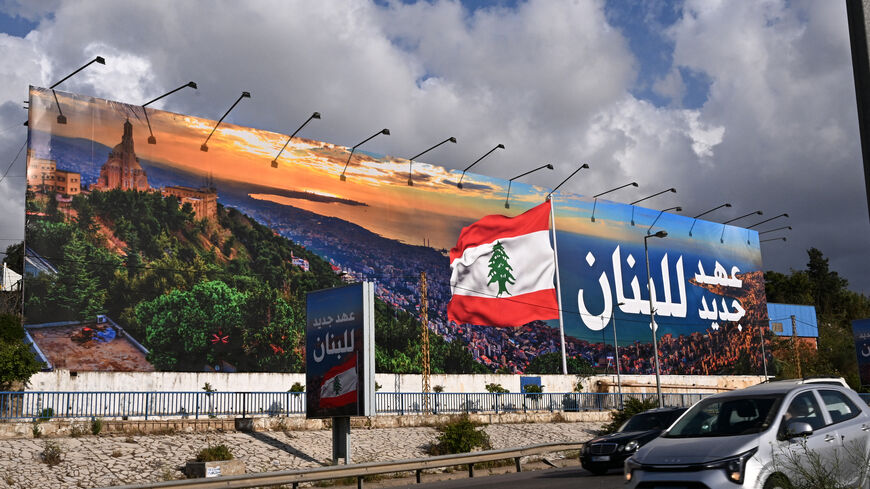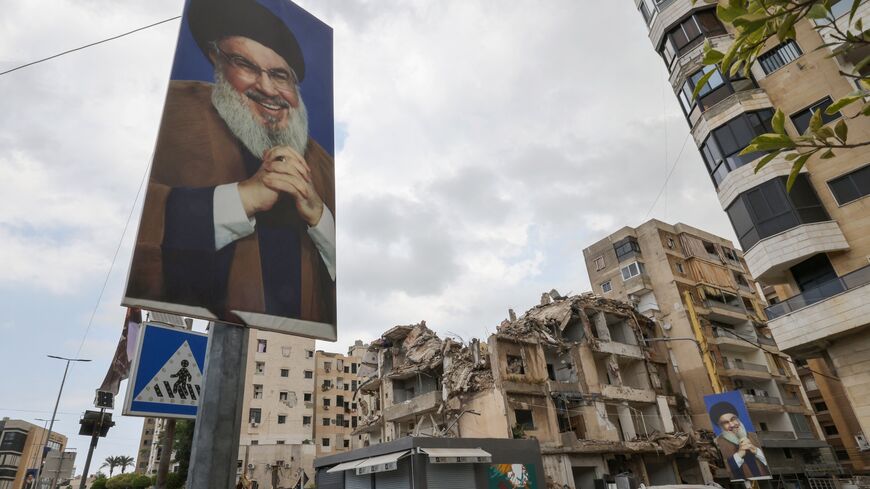Who is Lebanon's Jamaa Islamiya, latest to parade weapons against Israel?
Members of the Islamist group al-Jamaa al-Islamiya shot into the air during a funeral procession for two of its fighters killed in an Israeli drone strike in east Lebanon, causing widespread condemnation of the spread of uncontrolled weapons in the country.

BEIRUT — At least four people, including a child, were reportedly injured by stray bullets in Lebanon’s northern Akkar district during a funeral procession held by the Islamist group al-Jamaa al-Islamiya over the weekend.
Members of al-Jamaa al-Islamiya held a funeral procession Sunday in the town of Bebnine for two of the group's fighters. They were killed two days earlier in an Israeli drone strike in the eastern Bekaa region. Heavy gunfire accompanied the procession.
Dozens of masked and armed men were seen walking the town's streets, brandishing their weapons and firing in the air.
According to the local L’Orient Today news outlet, the stray bullets hit four people, including one woman, a man and a 10-year-old child who were inside their homes when the procession passed. Cars and property in the area were also reportedly damaged by the gunfire.
Al-Jamaa al-Islamiya is a Sunni Islamist political group founded in 1964 as the Lebanese branch of the Muslim Brotherhood. The group is present in Sunni-dominated cities and towns in both the south and the north. It is seen as an ally of Hamas and has carried out joint attacks with the group, one of its officials said last month.
Its military wing, al-Fajr Forces, was founded in 1982 to fight the Israeli invasion of Lebanon during the civil war at the time. Its relations with Hezbollah, the dominant Iran-backed Shia militant group in Lebanon, have fluctuated. The two took opposite sides during the civil war and in the conflict in Syria, with Jamaa opposing Syrian President Bashar al-Assad. Their relations have improved in the last two years and as Hezbollah-Hamas coordination increased inside Lebanon.
Uncontrolled arms
The videos and images of the armed men in Bebnine sparked widespread outrage among civilians and politicians and renewed the debate about the spread of weapons in the country amid the deterioration of the Lebanese state.
🔴 تحت عنوان "المقاومة" الجماعة الاسلامية تحولت إلى فصيل "سني" في جيش ايران غير الشرعي.
— طوني بولس (@TonyBouloss) April 28, 2024
🔴 شعار "المقاومة" يحول لبنان إلى "صومال لاند" على أشلاء الدولة. pic.twitter.com/rTTSIfbRQn
In a post on X on Sunday, independent parliament member Mark Daou condemned the presence of militias as a violation of the country’s sovereignty, calling for the state for arms control.
Ibrahim Mneime, another independent lawmaker, said al-Jamaa al-Islamiya bears responsibility for the “military demonstration” and the fall of the wounded in Akkar. He also condemned what he described as the group maintaining control of these weapons through intimidation.
Gunfire at events like weddings and funerals is common in some parts of Lebanon. Supporters of the Shiite Hezbollah movement are known for firing bursts of bullets in the air when the group’s leader, Hassan Nasrallah, delivers his televised speeches.
ليست الدولة مسؤولة عن التخلف والجهل في عكار. فأبناؤها يتحملون هذه المسؤولية عبر إعادة انتاج نفس العائلات التي أثرت نفسها على حساب الخزينة العامة التي كان مفترض ان تنمي عكار وتطوّرها. واليوم تحلّ #الجماعة_الاسلامية بتخلفها ضيفاً ثقيلاً على قلوب اللبنانيين انطلاقاً من عكار. هنيئاً pic.twitter.com/sGBTkA0cLi
— Riad Tawk (@Riadtawk) April 28, 2024
The practice has killed several people over the years. Most recently, last August, a seven-year-old girl was killed when a stray bullet struck her in the head while she was at a summer camp in the town of Hadath near Beirut.
Arms possession in Lebanon is poorly regulated and many civilians along with Palestinian and Lebanese factions own firearms. Hezbollah, which is heavily backed by Iran, owns a large arsenal of weapons that includes thousands of rockets, anti-tank missiles and drones.
Amid the controversy, Al-Jamaa al-Islamiya issued a statement on its website saying it regretted “the armed convoy and shooting during the funeral procession from Tripoli to Bebnine.” The statement went on, “Any scene that raises panic and fear among the Lebanese is unacceptable,” and “We affirm that the group is keen on the stability of the homeland and the security of citizens.”
Hostilities on Israel-Lebanon border
Since the cross-border hostilities between Israel and Hezbollah erupted in October, al-Jamaa al-Islamiya’s military wing has claimed several rocket launches toward Israeli territory.
On Friday, two senior commanders of the group were killed when an Israeli drone strike hit their vehicle on a road linking the villages of Sarira and Meidoun in the Bekaa region in the east of the country. The group identified the commanders as Mosab Saeed Khalaf and Bilal Mohammed Khalaf.
Israel confirmed the strike, saying it had killed Mosab Khalaf, who was behind a series of attacks against Israel in Shebaa Farms, a disputed territory in the south near the Israeli-occupied Golan Heights.
Iran-backed Hezbollah and the Israeli army have been exchanging heavy fire along the southern border since Oct. 8, the day after the Israel-Hamas war in the Gaza Strip broke out.
Several Palestinian factions and allied groups inside Lebanon have since joined the battle in support of Hamas.
In a statement on Telegram, Hamas’ military wing the Izz ad-Din al-Qassam Brigades claimed responsibility for a barrage of rockets fired from southern Lebanon toward northern Israel on Monday.
The Israeli military told Agence France Presse that 20 rockets were launched toward Israel from Lebanon and that most of the projectiles were intercepted.





